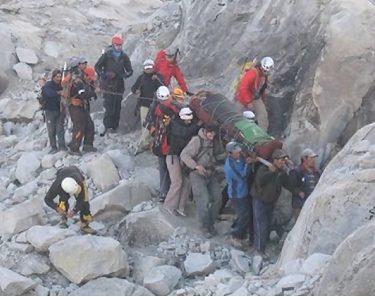|
|
Second-year medical student Keith Azevedo headed down to Huaraz, Peru, last summer hoping to refine his language skills while working at a public hospital and with a mountain rescue group in the Cordillera Blanca as part of UMass Medical School’sMulticultural Pathways Program. What he didn’t anticipate was that his extensive wilderness survival training would be needed to save the life of an Austrian mountain climber.
One weekend while he and his wife, Meredith, both experienced climbers, were indulging in their passion for extreme mountaineering and tackling the technically challenging Alpamayo, one of Peru’s most beautiful peaks, Azevedo connected with a friend and guide on the mountain and arranged to help treat minor injuries at the mountain’s advanced base camp at an altitude of approximately 18,000 feet.
Returning to base camp after a successful summit attempt, the couple received word of a terrible accident near the 20,000-foot summit, an accident that killed an Argentinian guide and injured three others climbers from Austria. A certified wilderness EMT, with training in arctic survival techniques, Azevedo turned out to be the most qualified person to lead an intense, two-day rescue mission that brought the most seriously injured, a hiker with a broken back, down the mountain to a life-saving flight to Lima.
“Going there, I thought I would be working as part of a team and in less of a leadership position,” said Azevedo. “At the same time, it was incredibly rewarding to have the skills that could help in saving another person’s life. I still am in contact with the most seriously injured climber who is continuing rehabilitation back in Austria. He e-mails me quite a bit even today and is very excited about the fact that he is alive and doing well.”
Azevedo and his wife are no strangers to international adventure. In the fall of 2006, they founded Global Partnerships for Health and Education [www.gphe.org] (GPHE) a non-profit organization that examines access to health care and education in the developing world. As part of GPHE, they spent the next three years bicycling more than 25,000 miles around the world, through Southeast Asia, Central Asia, the Middle East and Europe, while doing first-hand research on the status of health care and education. The Azevedos, former high school teachers, used their Web site to share their research directly to students at home throughout the adventure.
Near the end of their trip, four days before they were scheduled to fly back to the United States so Keith could start at UMMS, they encountered a life-or-death experience of their own. In Mongolia, Keith crashed his bike speeding down a poorly graded mountain road, and ended up with a broken neck and wrist, dislocated shoulder and swelling of the brain. The couple realized that of all the countries they had visited, the one where Keith ended up requiring medical attention was the most remote and underserved. After five long days of extremely limited medical attention, Keith was finally airlifted to Singapore, where he spent two weeks recovering.
Now immersed in the relatively calm world of medical school, the Azevedos still manage to get their mountain climbing fix in, although they don’t go much further than New Hampshire these days.
“Ultimately, we’d like to run a rescue group in a place like Alaska or Colorado,” said Keith. “We have such a love of the wilderness and climbing, it seems a natural fit.”

